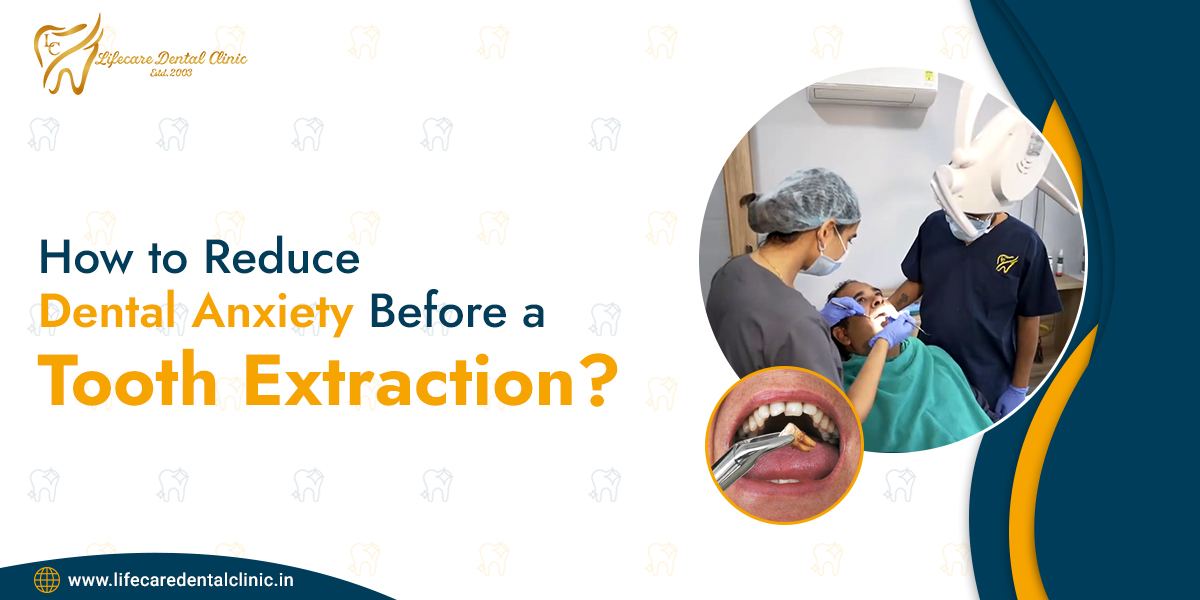How to Reduce Dental Anxiety Before a Tooth Extraction?

Published Date: June 04, 2024 Last Update: September 27, 2024
Author: Dr. Kirandeep Kaur
Tooth extractions are a common dental procedure, but that doesn't mean they have to be anxiety-inducing. If you're feeling nervous about an upcoming extraction, know that you're not alone. Dental anxiety is a real concern, but there are effective ways to manage it and ensure a smooth and comfortable experience. In this blog, you’ll explore tips to reduce your dental anxiety for a smooth and anxiety-free tooth extraction.
Understanding Dental Anxiety
Dental anxiety can manifest in various forms, from fear of needles to apprehension about pain or the unknown. It's perfectly normal to feel anxious about dental visits, particularly when it involves a procedure that may seem daunting or uncomfortable. Recognizing and acknowledging these fears is the first step toward managing them effectively. Here are some key points to understand about dental anxiety during tooth extraction:
1. Fear of Pain
One of the primary reasons for dental anxiety is the fear of experiencing pain during the procedure. Despite advancements in dental technology and anesthesia, the anticipation of pain can still cause significant anxiety for some individuals.
2. Fear of the Unknown
Many people feel anxious because they're unsure about what to expect during a tooth extraction. Lack of understanding about the procedure itself, the tools involved, and the sensations they might experience can contribute to heightened anxiety.
3. Previous Negative Experiences
Past traumatic experiences at the dentist's office, particularly during dental procedures, can lead to a fear of similar situations in the future. These experiences may create a cycle of anxiety that's difficult to break without proper support and reassurance.
4. Loss of Control
Feeling out of control during a dental procedure can intensify anxiety. Patients may feel vulnerable or helpless while sitting in the dental chair, which can exacerbate their fear and discomfort.
5. Embarrassment or Self-Consciousness
Some individuals feel embarrassed or self-conscious about their dental health, especially if they haven't been diligent about oral hygiene. This embarrassment can amplify anxiety about visiting the dentist and undergoing procedures like tooth extraction.
Read This Article - Top 6 Reasons Why a Tooth Extraction is Important
Tips to Reduce Dental Anxiety
1. Trust and Communication
Establishing trust and open communication with the dental team is crucial for managing dental anxiety. Patients who feel heard, understood, and supported by their dentist and dental staff are more likely to feel comfortable and relaxed during procedures. The first step to conquering your anxiety is open communication with your dentist. So, express your concerns openly and honestly. Let them know about your fears, be it the needles, the unknown, or the potential for pain. A compassionate dentist in Chandigarh will listen to your fears and collaborate with you to establish a relaxed environment. Don't hesitate to inquire about the extraction process, the type of anesthesia used, and what to expect during and after the procedure.
2. Pain Management Options
Dentists have various pain management techniques available to help minimize discomfort during tooth extraction. Discussing these options with your dentist can alleviate anxiety and ensure a more comfortable experience. These can range from mild anti-anxiety medication to nitrous oxide (laughing gas) or even deeper sedation techniques. Discuss these options with our best dentists in Chandigarh to determine the most suitable approach based on your anxiety level and the complexity of the extraction.
3. Relaxation Techniques
Incorporating relaxation techniques such as deep breathing, medication, or calming music can help reduce anxiety before and during tooth extraction. Practice these techniques before your appointment to calm your nerves. Some dental offices also offer amenities like TVs or noise-canceling headphones to distract patients and promote relaxation.
Read This Article - Dental Procedure Options for Missing Tooth Replacement in Tricity
4. Gradual Exposure
A gradual exposure approach may be beneficial for individuals with severe dental anxiety. This involves starting with less invasive dental procedures and gradually progressing to more complex treatments like tooth extraction, allowing patients to gradually acclimate to the dental environment.
5. Seeking Support
Having a trusted friend or family member accompany you to your appointment can significantly help in reducing anxiety. They can offer emotional support and act as a communication bridge between you and the dentist. Their presence can serve as a reassuring presence and facilitate communication between you and the dentist.
6. Distraction is Your Friend
Distraction can be a powerful tool in managing anxiety effectively. Sometimes, the best way to manage anxiety is to take your mind off it altogether. Bring along headphones and listen to calming music, engaging podcasts, or audio books during your wait and throughout the procedure (if possible) to divert your attention.
7. Medication Can Help
If prescribed by your dentist, anti-anxiety medication can help alleviate pre-procedural anxiety. Adhere to the prescribed dosage and timing to maximize its effectiveness. Consult with our dentists for guidance on medication usage.
8. Plan for a Smooth Recovery
Understanding what to expect after the extraction can alleviate anxiety about the post-operative period. Discuss post-operative care instructions with your dentist, including pain management strategies and dietary recommendations. Feeling prepared for recovery can mitigate stress and promote a smoother healing process.
Conclusion
Dental anxiety is a common concern, but it doesn't have to overshadow your dental experience. By implementing these strategies, you can navigate tooth extractions with confidence and ease. Remember, you're not alone in this journey, and support is readily available to help you overcome anxiety and achieve optimal oral health.

Leave A Reply